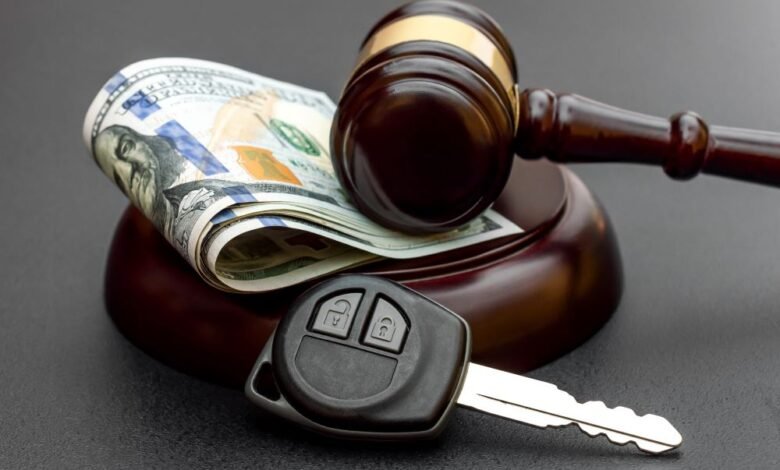Personal injury law plays a pivotal role in ensuring individuals who suffer harm due to accidents or negligence are compensated fairly. This area of law allows people to seek justice and receive damages for injuries that impact their physical, emotional, and financial well-being. Whether it’s a car accident, a slip and fall, or a workplace injury, personal injury law provides a means of holding responsible parties accountable. In this guide, we’ll explore the fundamentals of personal injury law, why it’s crucial to hire an injury attorney, and specifically focus on the importance of selecting the right attorney in Shreveport, Louisiana.
Overview of Personal Injury Law
Personal injury law is designed to protect individuals who have been harmed due to the wrongful actions or negligence of others. It encompasses a wide range of cases, including automobile accidents, medical malpractice, workplace injuries, product liability, and more. When someone is injured, personal injury law allows them to file a claim for damages, which can include medical expenses, lost wages, pain and suffering, and other costs associated with the injury.
The legal process typically involves proving that the defendant was at fault and that their actions directly resulted in the plaintiff’s injury. Personal injury claims may be settled through negotiation or go to trial, depending on the complexity of the case and the willingness of both parties to reach an agreement. A personal injury lawyer is essential to help navigate this often-complex process, ensuring the injured party receives the compensation they deserve.
Importance of Hiring an Injury Attorney
Hiring an experienced personal injury attorney is crucial for several reasons. First and foremost, personal injury law can be intricate, and dealing with insurance companies or other parties without legal representation can lead to complications or unfair settlements. A skilled attorney understands the legal system, can gather the necessary evidence, and will advocate for your best interests throughout the process.
In addition, injury attorneys operate on a contingency fee basis, meaning they are paid only if you win your case. This arrangement makes legal representation accessible to individuals who may not have the financial means to pay hourly fees. Attorneys also have the resources and expertise to evaluate the full extent of your injuries, ensuring that all costs—both immediate and long-term—are accounted for in your claim.
Furthermore, personal injury attorneys are familiar with state-specific laws, statutes of limitations, and procedural requirements. They ensure that you meet all deadlines and file the correct paperwork to avoid dismissals or delays. With an attorney’s guidance, you have a better chance of achieving a favorable outcome, whether through settlement or litigation.
Focus on Shreveport
When seeking a personal injury attorney, it’s important to focus on local expertise, especially in areas like Shreveport, Louisiana. Shreveport has its unique set of legal and procedural nuances, and an attorney familiar with the local court system can be a significant advantage. Local attorneys are more likely to have established relationships with judges, insurance companies, and other professionals in the area, which can work in your favor during negotiations or trial.
Additionally, Shreveport’s unique demographics and common causes of accidents—such as highway collisions, construction site injuries, and injuries related to local businesses—require a personalized approach. A lawyer who understands the common issues in Shreveport will be able to better assess your case and develop a strategy that aligns with local practices.
In Shreveport, where personal injury law cases are subject to Louisiana’s specific statutes, choosing an attorney with experience in the state’s legal framework is critical. They will be well-versed in the Louisiana Civil Code, which governs many aspects of personal injury claims in the state, and can use that knowledge to maximize your chances of success.
In conclusion, personal injury law serves as a vital safeguard for those who have been wronged by the negligence or intentional actions of others. Hiring an experienced injury attorney ensures that you have the right guidance and support throughout the process. In Shreveport, finding a local attorney who understands both the legal intricacies and community-specific issues will increase your chances of securing the compensation you deserve.
Understanding Personal Injury Law
Personal injury law is designed to provide individuals with legal recourse when they are harmed due to the negligence, recklessness, or intentional actions of another party. This area of law ensures that injured individuals can seek compensation for their losses, whether physical, emotional, or financial. The legal principles behind personal injury law allow victims to hold the responsible party accountable for the harm they caused. Understanding the types of personal injury cases and the laws governing them is crucial for those seeking justice and fair compensation.
Definition of Personal Injury
Personal injury refers to any physical, emotional, or psychological harm that is caused by another party’s negligence, wrongful acts, or intentional misconduct. The injured party may be entitled to financial compensation for their medical expenses, lost wages, pain and suffering, and other related damages. In a legal context, a personal injury claim typically involves proving that the defendant was responsible for the plaintiff’s injuries through a failure to exercise reasonable care or through an intentional harmful act.
Types of Personal Injury Cases
Personal injury law covers a wide range of cases, each with its own complexities and legal considerations. Some of the most common types of personal injury cases include car accidents, medical malpractice, slip and fall incidents, workplace accidents, and product liability. Below, we will discuss these categories in more detail to give you a clearer understanding of how personal injury law applies to various situations.
Car Accidents
Car accidents are among the most frequent types of personal injury cases. Whether caused by a distracted driver, speeding, impaired driving, or another form of negligence, car accidents can result in serious injuries, including broken bones, whiplash, head trauma, or even wrongful death. In a car accident case, the injured party must prove that the other driver was at fault and that their negligence directly caused the injury. State laws vary, but many follow a fault-based system where the at-fault driver’s insurance is responsible for covering damages.
Medical Malpractice
Medical malpractice occurs when a healthcare provider, such as a doctor, nurse, or hospital, fails to provide the standard of care expected in the medical field, resulting in injury to the patient. This can include misdiagnosis, surgical errors, medication mistakes, or failure to provide adequate care. Victims of medical malpractice may seek compensation for pain and suffering, medical bills, lost wages, and other consequences of the injury. Proving medical malpractice often requires expert testimony to demonstrate how the healthcare provider’s actions deviated from accepted practices.
Slip and Fall Incidents
Slip and fall accidents occur when a person is injured due to a hazardous condition on someone else’s property, such as wet floors, uneven surfaces, or poorly lit areas. Property owners have a legal duty to maintain safe conditions for visitors and guests. If a property owner fails to address hazards or warn visitors about them, they may be held liable for any injuries that result. Common slip and fall injuries include broken bones, sprains, and head injuries. In such cases, the injured party must show that the property owner was negligent in maintaining the premises or failed to warn visitors about the danger.
Workplace Accidents
Workplace accidents can occur in any industry, from construction sites to office environments. Common injuries include falls, machinery malfunctions, repetitive strain injuries, and exposure to harmful substances. In many cases, workers are entitled to compensation through workers’ compensation insurance, which provides benefits for medical expenses and lost wages without the need to prove fault. However, if an employer’s negligence or intentional actions contributed to the accident, the injured party may also be able to file a personal injury lawsuit in addition to workers’ compensation claims.
Product Liability
Product liability refers to the responsibility of manufacturers, distributors, or sellers when a product is defectively designed, manufactured, or labeled, leading to consumer harm. If a consumer is injured by a defective product, they may be entitled to compensation. These cases often involve products such as automobiles, medical devices, pharmaceuticals, and household appliances. To succeed in a product liability case, the plaintiff must prove that the product was defective and that the defect directly caused the injury.
Overview of Louisiana Personal Injury Laws
Personal injury laws vary from state to state, and Louisiana has its own unique legal framework governing personal injury claims. Louisiana follows a “comparative fault” rule, which means that if an injured party is partially responsible for their own injury, their compensation may be reduced by their percentage of fault. However, as long as the injured party is not more than 50% at fault, they can still recover damages.
Louisiana also has specific laws regarding the statute of limitations, which is the time period during which a person can file a personal injury claim. In most cases, the statute of limitations for personal injury in Louisiana is one year from the date of the injury. However, there are exceptions for cases involving certain types of injury, such as medical malpractice or cases involving minors.
Additionally, Louisiana uses a civil law system, meaning that judges rely more on written laws and codes than on precedents set by previous court decisions. This can make Louisiana’s legal process somewhat distinct from that of other states, which follow a common law system. This makes it essential for those filing personal injury claims in Louisiana to work with an attorney who is well-versed in the state’s unique legal principles.
Personal injury law is a broad field that covers a variety of cases from car accidents to workplace injuries. Understanding the different types of personal injury cases and how Louisiana law governs these matters is crucial for individuals who have been harmed due to the negligence or wrongful actions of others. If you or someone you know is involved in a personal injury case, it is important to seek legal advice to ensure that your rights are protected and that you receive the compensation you deserve.
Why Choose a Shreveport Injury Attorney?
When you’re injured due to someone else’s negligence, navigating the complexities of personal injury law can be overwhelming. Hiring a Shreveport injury attorney offers specific advantages, including local expertise, a nuanced understanding of Louisiana laws, and tailored representation for your case.
Local Expertise and Knowledge
A Shreveport-based attorney is deeply familiar with the region’s legal environment, making them well-suited to handle personal injury cases within the area. Their proximity allows for a personalized approach, frequent communication, and on-site assistance when necessary.
Familiarity with Local Courts and Procedures
Shreveport attorneys understand the local court systems, including administrative nuances that can significantly impact the progress of your case. They have relationships with local judges, clerks, and opposing counsel, which can streamline procedural matters and potentially lead to faster resolutions.
Understanding of Local Jurisprudence
Louisiana’s legal system is unique in the United States, as it is rooted in civil law traditions rather than common law. This distinct jurisprudence requires an attorney who understands its intricacies. Shreveport injury attorneys are well-versed in local laws, ensuring your case is argued with accuracy and authority.
Qualities to Look for in an Injury Attorney
Choosing the right attorney involves assessing several critical attributes. A strong legal advocate should possess a combination of professional experience, effective communication skills, and a proven ability to achieve favorable outcomes.
Experience and Track Record
An attorney’s experience in handling personal injury cases is crucial. Look for a lawyer who specializes in personal injury law, with a demonstrated history of success in cases similar to yours. Ask about their settlement rates, trial experience, and notable case outcomes to gauge their effectiveness.
Communication Skills
Clear, consistent communication is vital when working with a personal injury attorney. They should be able to explain complex legal terms in layman’s terms and keep you informed about your case’s progress. Attorneys who are accessible and responsive provide peace of mind during a challenging time.
Client Reviews and Testimonials
Reviews from previous clients can offer valuable insights into an attorney’s reliability, professionalism, and results. Look for testimonials highlighting positive client experiences and successful case outcomes. Additionally, online platforms and word-of-mouth recommendations can help identify trustworthy legal counsel.
Fee Structure and Costs
Understanding an attorney’s fee structure upfront can prevent surprises later. Most injury attorneys operate on a contingency fee basis, meaning they only get paid if you win your case. However, it’s essential to clarify any additional costs, such as court fees or expert witness expenses.
Negotiation Skills
Strong negotiation skills are a hallmark of an effective injury attorney. Whether dealing with insurance companies or opposing counsel, your lawyer should be adept at securing maximum compensation for your injuries. Their ability to negotiate fair settlements often saves time and avoids the stress of a trial.
The Process of Hiring an Injury Attorney: A Step-by-Step Guide
Navigating a personal injury case can feel overwhelming, but hiring a skilled attorney simplifies the process and increases the likelihood of a favorable outcome. This guide outlines the key steps involved in hiring and working with a personal injury attorney, helping you understand what to expect during your case.
The Process of Hiring an Injury Attorney
Initial Consultation
The journey begins with an initial consultation, typically offered free of charge. This meeting allows you to discuss the details of your case, including the circumstances of your injury, the parties involved, and any evidence you have gathered. During this conversation, the attorney evaluates the potential merits of your case and answers your initial questions. It’s also an opportunity for you to assess whether the attorney is the right fit for your needs.
Evaluating Case Strength
Once the consultation concludes, the attorney will assess your case’s strength. This evaluation involves reviewing evidence such as medical records, police reports, and witness statements. They will determine whether negligence occurred, the extent of damages, and the likelihood of securing compensation. A candid assessment of the case ensures both parties have realistic expectations moving forward.
Setting Expectations
A critical part of hiring an injury attorney is understanding the legal process and setting realistic expectations. Your attorney should provide a roadmap of what to expect, including timelines, potential challenges, and likely outcomes. This transparency helps build trust and ensures that you are fully informed throughout the process.
Understanding Retainer Agreements
Before officially hiring an attorney, you will sign a retainer agreement outlining the terms of representation. This document specifies the attorney’s fee structure, usually on a contingency basis, meaning they are only paid if you win your case. Additionally, the agreement may detail costs such as court fees or expert witness expenses. Take the time to read and understand the terms before signing.
What to Expect During Your Case
Investigation and Evidence Gathering
Once retained, your attorney will begin a thorough investigation to build a strong case. This involves gathering critical evidence such as accident reports, medical records, surveillance footage, and witness testimonies. In some cases, experts such as accident reconstructionists or medical professionals may be brought in to provide further analysis and support.
Negotiating with Insurance Companies
One of the attorney’s primary responsibilities is negotiating with insurance companies on your behalf. Insurers often aim to minimize payouts, but a skilled attorney knows how to counter lowball offers and advocate for maximum compensation. This phase requires persistence and expertise, as most personal injury cases are resolved through settlements rather than going to trial.
Filing a Lawsuit if Necessary
If negotiations fail to yield a fair settlement, your attorney may recommend filing a lawsuit. This step involves submitting formal legal documents to the court and initiating the litigation process. Your attorney will represent you throughout pre-trial motions, discovery, and, if necessary, a courtroom trial. While litigation can be lengthy, it ensures your right to seek full and fair compensation.
Common Questions About Injury Claims
How Long Will It Take to Settle?
The timeline for settling a personal injury case varies widely based on factors such as the case’s complexity, the extent of injuries, and the willingness of both parties to negotiate. Simple cases might settle in a matter of weeks, while more complex claims involving litigation can take months or even years. Your attorney will provide a realistic estimate based on your unique circumstances and keep you informed throughout the process.
What Damages Can Be Recovered?
Personal injury claims aim to compensate victims for their losses. Recoverable damages generally include medical expenses, lost wages, property damage, and future medical care. In some cases, victims may also recover non-economic damages such as emotional distress, loss of enjoyment of life, or pain and suffering. Your attorney will evaluate all possible avenues of compensation to ensure you receive a fair settlement.
Can You Claim for Pain and Suffering?
Yes, pain and suffering are recognized as compensable damages in personal injury cases. These damages account for physical pain, emotional distress, and the overall impact of the injury on your quality of life. Calculating pain and suffering can be subjective, but experienced attorneys use proven methods, such as multipliers or per diem calculations, to argue for an appropriate amount.
Will My Case Go to Trial?
Most personal injury cases are resolved through settlements and never reach trial. However, if negotiations with the at-fault party or insurance company fail, your attorney may recommend pursuing litigation. In such cases, the matter will proceed to court, where a judge or jury will determine the outcome. An experienced attorney will prepare for trial while aiming for a fair settlement to avoid the uncertainty of court proceedings.
Case Studies and Success Stories
Notable Cases in Shreveport
Shreveport injury attorneys have handled a wide range of cases, from car accidents and workplace injuries to medical malpractice claims. For instance, in a recent case, a local attorney secured a six-figure settlement for a client injured in a multi-vehicle collision caused by a distracted driver. By leveraging expert testimonies and detailed evidence, the attorney demonstrated the extent of the client’s injuries and the financial toll they endured.
Lessons Learned and Best Practices
Successful cases often hinge on thorough preparation, clear communication, and relentless advocacy. Lessons from past cases highlight the importance of timely evidence gathering, working with credible experts, and maintaining open communication between clients and attorneys. Selecting an attorney with a proven track record in cases similar to yours can significantly improve your chances of a positive outcome.




